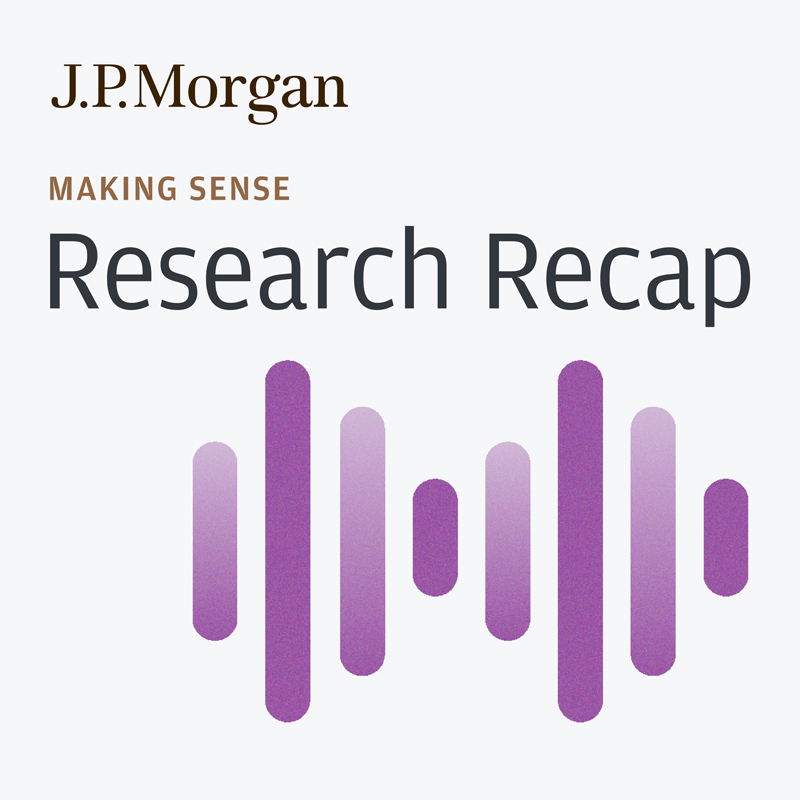
From: Research Recap
Every two weeks, each new podcast episode will bring you the latest news and views from J.P. Morgan’s award-winning Research analysts, who cover everything from sector-specific trends to the state of the global economy.

As President Trump approaches the 100-day mark of his second term, what has gone as expected and what has left experts surprised? Join Samantha Azzarello, head of content strategy for J.P. Morgan Research as she discusses President Trump’s first 100 days and beyond with Bruce Kasman, chief global economist, Kamal Tamboli, U.S. equity strategist and Natasha Kaneva, head of Global Commodity Strategy. With heightened trade policy uncertainty stemming from a flurry of tariff activity, what will J.P. Morgan Research be watching in the coming weeks and months?
Four key takeaways from President Trump’s first 100 days in office
1. The U.S. is likely heading for a mild recession
On the trade front, disruptive policy action has led to an environment of uncertainty that is likely to persist. As a result, J.P. Morgan Research now sees a 60% chance of a recession in 2025. “I want to emphasize that while we have a recession in our forecast, it's mild. And it's by no means preordained. In fact, I think the economy is doing reasonably well,” said Bruce Kasman, J.P. Morgan’s chief global economist. “We think it will take some time to realize the drags that are in place from the tariff shocks. But we look to see the economy begin to falter as we move through the middle part of the year and as we move towards a recession, which we expect to happen sometime in the third quarter.”
2. Policy shifts are weighing on business sentiment
Shifts in policy and the resulting uncertainty are starting to weigh on sentiment, one factor behind J.P. Morgan’s Research’s heightened recession forecast. “We had thought that the Trump administration would move aggressively on a number of fronts. But we had also anticipated that there would be guardrails … reflecting a commitment to supporting the business sector, and a sense that the economy's near-term performance would be of a priority,” said Kasman.
“The opportunities were supposed to outweigh the risks this year,” said Kamal Tamboli, U.S. equity strategist at J.P. Morgan. “But given the significant increase in policy uncertainty … there’s a risk that this tariff shock negatively affects sentiment and spills over into the real economy, ultimately affecting consumer demand and complicating the situation for corporate supply chains and logistics.”
The specific policies that could shift sentiment in the coming weeks and months are:
- Immigration policy and how this will affect growth, labor supply and demand
- Regulatory policy, which could make it easier to do business
- Fiscal policy, which could see TCJA tax cuts extended and further ahead, the potential for a modest set of tax and spending cuts
3. Investors may need to think longer term
J.P. Morgan expects the equity market to remain rangebound, but the current environment is very difficult for forecasters given headline risk. Renewed tariff escalation, broad-based sectoral tariffs and the persistence of U.S.-China tensions could cement in a high volatility environment for longer, and the possibility of tipping into a recession needs to be considered. “Given the policy uncertainty and … evolving trade narrative, it is very possible that corporates will find it difficult to provide concrete guidance,” said Tamboli. “But what we would expect to gain at the very least, is clarity on mitigation strategies in the near term, the extent of supply chain exposure and what it means for margins.”
“Investors need to start looking at what a more trade neutral environment might be in 2026,” Tamboli added. “2026 … may experience more growth and lower trade disruptions. Presuming we avoid a recession, 2026 likely has more fiscal supports if the proposed tax cuts are passed and it will perhaps be a cleaner year if we have a meaningful trade de-escalation and some pickup in onshoring activity.”
4. The second half of 2025 may see weakness in oil demand
For oil, the first quarter of 2025 was solid and the second quarter should follow suit. J.P. Morgan Research has observed front loading of demand, without observing any signs of a slowdown. “We most likely will have a solid first half of the year in the oil demand, and a weaker second half of the year,” said Natasha Kaneva, head of Global Commodity Strategy.
“The Trump administration is very actively and openly pursuing a substantially lower oil price,” Kaneva added. “Now they're saying it's actually $50 to $55. But that's where the floor to the price is. The feed through, it's not through the policies. It's actually what is happening in the economy. Since World War II, we’ve had only two examples of global recession during the COVID-19 pandemic and the Global Financial Crisis … It’s very, very rare to have something like that in the case of oil. Hopefully, that's not going to be the environment this time around. Our economists are giving us a mild recession.”
What else is J.P. Morgan Research saying?
“Real GDP growth is now expected to be -0.3% for the year, down from 1.9% earlier this year. Heightened trade policy uncertainty should weigh on activity growth, particularly for capital spending. Plus, tariffs that have already been imposed will create a bump to headline inflation, pushing up consumer prices by 0.2 percentage points,” said Michael Feroli chief U.S. economist at J.P. Morgan.
“U.S.-based world market futures benchmarks hold a strong relationship with U.S. availability. U.S. import tariffs raise domestic inflationary concerns for agricultural and food products. The evolution of trade, immigration and foreign policy is projected to add complexity and raise volatility, particularly across U.S. trade–exposed soybean, grain and livestock markets. China’s retaliation against sky-high U.S. import tariffs shuts down new crop U.S. export sales to the leading export destination without a deal,” said Tracey Allen, head of Agricultural Commodities Strategy at J.P. Morgan.
“In Commodities Research, we assume that a Russia-Ukraine ceasefire will occur in 2025. Accordingly, we believe that the increase in Russian gas flowing to Europe is a question of “when” rather than “if”. Therefore, we have embedded a modest 15 Bcm/year of increased Russian natural gas flows in our forecasts starting gradually in the second half of 2025,” said Otar Dgebuadze, European Gas and Global LNG analyst.
“Aluminum remains in particular focus. With a 25% tariff applied on Canadian aluminum imports, we forecast it will reach $2,200/mt in the second quarter of 2025,” said Gregory Shearer, head of Base and Precious Metals Strategy.
Get the latest on U.S. tariffs and their impact on the economy from J.P. Morgan Research.
Read an analysis on aluminum, steel and copper prices from J.P. Morgan Research.
This communication is provided for information purposes only. Please visit www.jpmm.com/research/disclosures for important disclosures. JPMorgan Chase & Co. or its affiliates and/or subsidiaries (collectively, J.P. Morgan) normally make a market and trade as principal in securities, other financial products and other asset classes that may be discussed in this communication.
This communication has been prepared based upon information from sources believed to be reliable, but J.P. Morgan does not warrant its completeness or accuracy except with respect to any disclosures relative to J.P. Morgan and/or its affiliates and an analyst's involvement with any company (or security, other financial product or other asset class) that may be the subject of this communication. Any opinions and estimates constitute our judgment as of the date of this material and are subject to change without notice. Past performance is not indicative of future results. This communication is not intended as an offer or solicitation for the purchase or sale of any financial instrument. J.P. Morgan Research does not provide individually tailored investment advice. Any opinions and recommendations herein do not take into account individual circumstances, objectives, or needs and are not intended as recommendations of particular securities, financial instruments or strategies. You must make your own independent decisions regarding any securities, financial instruments or strategies mentioned or related to the information herein. Periodic updates may be provided on companies, issuers or industries based on specific developments or announcements, market conditions or any other publicly available information. However, J.P. Morgan may be restricted from updating information contained in this communication for regulatory or other reasons. This communication may not be redistributed or retransmitted, in whole or in part, or in any form or manner, without the express written consent of J.P. Morgan. Any unauthorized use or disclosure is prohibited. Receipt and review of this information constitutes your agreement not to redistribute or retransmit the contents and information contained in this communication without first obtaining express permission from an authorized officer of J.P. Morgan.
Copyright 2025, JPMorganChase & Co. All rights reserved.